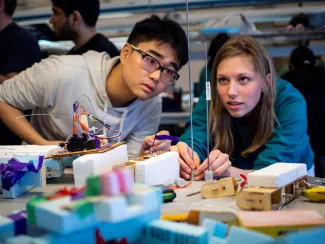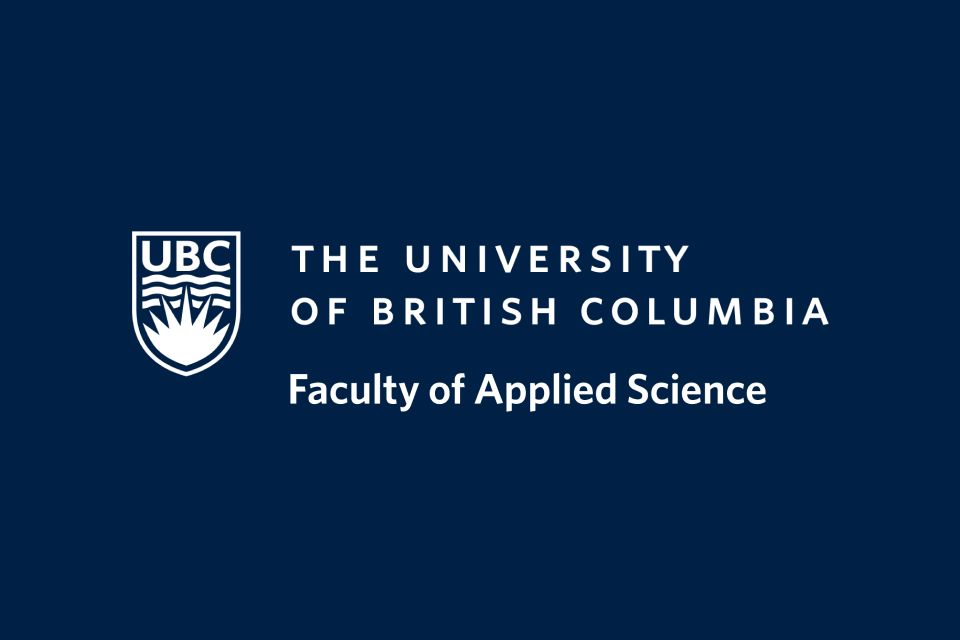"I am a strong believer that it is crucial to always take pride in your work, be thorough and pay attention to the details."

Joel Hunter
- Degree:
- Bachelor of Applied Science
- Grad year: 2020
- Program:
- Campus: Okanagan
After completing a diploma in mechanical engineering technology from the Southern Alberta Institute of Technology, Joel Hunter knew that he had found an area of interest to pursue further. Joel went on to Camosun College, where he received an advanced diploma to bridge into an engineering degree. He completed his two final years of post-secondary education at the University of British Columbia Okanagan Campus.
Joel was a dedicated member of the Advanced Thermofluidic Laboratory (ATFL). His work involved the prototyping of various gas detection devices, with his primary project involving the detection of aqueous hydrogen sulfide in sewers. Joel often participated in presentations for industry partners and was a lead operator during two separate field-testing visits to a Vancouver facility. Joel was a leader in his laboratory and was often working with new undergrads to inspire and encourage future work on this project.
Undergraduate research completely changed Joel’s engineering education experience. By applying his knowledge to relevant engineering problems, he built the confidence that he felt was necessary to be ready to enter the workforce. This experience led to Joel receiving an EIT position immediately upon graduating.
Why did you choose to go into your field of study at UBC?
I was drawn to engineering by a general sense of curiosity about human creations. Coupled with an interest in mathematics and physics, engineering seemed to be a natural fit. I chose mechanical as my specialization because it is a broad field of study and it allowed for many different career choices once my degree was finished.
The intellectual challenge of problem-solving while working in a team requires being articulate and open-minded when speaking with teammates. I enjoy the challenge of clearly communicating design ideas. It is not always a simple task when one person has an image in their head and others are trying to put aside their own biases to envision this unknown image. This social component of engineering balances out the rigorous technical aspects nicely.
What has made your time at UBC memorable?
There were two defining memories from UBCO: undergraduate research and the Engineering Capstone Project. Undergraduate research was a gratifying endeavour that connected me to an amazing community and helped develop my problem-solving skills with a hands-on approach. The Engineering Capstone Project required the application of fundamental concepts from many fields of engineering. This project both summarized my engineering studies and put the finishing touch on the five-year long journey.
One of the commonalities between these two memories are the people involved. In both cases the projects consisted of highly motivated and driven students who all held the project to a high priority. We had a diverse mix of skills and access to accomplished professors as leaders and mentors. These mentors displayed passion and dedication that we all desired to follow. It is immensely exciting and rewarding to work with a team of people who all have the same goals in mind.
What has been your most valuable non-academic experience studying at UBC?
My most valuable non-academic experiences at UBCO were the networking events put on by EGBC. They began with a panel of speakers and a Q&A period in a lecture hall before moving into the lobby area where students had the opportunity to mingle with engineers from various local companies.
These events were a beneficial exercise to gauge the industry and to practice different interview techniques in a more relaxed environment. I learned to simply be myself, put aside the potential for a job opportunity and just try to get to know the different people. When this happened, the conversation flowed back and forth much more naturally.
Tell us about your experience in your program. What have you learned that is most valuable?
The most valuable skill that I have acquired through this program is the ability to process new information. In essence, I have learned how to learn. This skill was not intentional but rather developed as a by-product of a commitment and care to my studies. I am a strong believer that it is crucial to always take pride in your work, be thorough and pay attention to the details. There were times throughout the degree where I questioned the practicality of the subject matter — and sure, in some cases I may never see or need this information again — but I approached these situations as an opportunity to hone my skills. The true test that my academic career prepared me for only begins after graduation.
How are you applying the skills you learned through your studies at UBC?
As a graduate EIT, every day I encounter a continuous stream of new information. I am soaking it in and applying both the learning abilities and time management skills that I developed from my studies to manage these new projects. I am surrounded by an inspiring group of mentors, similar to having knowledgeable professors. I am observing, taking notes and asking questions whenever possible. I have also immediately applied the team mentality that was developed through various group projects.
What advice would you give a student entering your degree program?
Make sure that your heart is in it. If you are completely committed, have passion and determination, then you will manage the engineering degree just fine.
Also, I would have liked to become involved with undergraduate research earlier on in my studies at UBCO. I highly recommend it as a flexible and engaging medium to develop your engineering skills. Either through volunteering or a work-study position, there are many resources to further explore topics of interest with a hands-on approach. There is a strong graduate community to become a part of and much to be learned from the more experienced students. It is also a community of inspiring people with similar interests where life-long friends can be made.
How do you feel your degree has benefitted you compared to a different field of study?
This is a difficult comparison to make as there are always benefits within any field of study that may not be immediately obvious. Back when I began the engineering technology program, I was deliberating between specializing in electrical or mechanical engineering. I ended up choosing mechanical and have sometimes wondered if electrical would have been the more relevant option. In reality, the two disciplines are intertwined and many applications rely on the two of them working together. I was able balance my studies by enrolling in many online courses.
Where do you find your inspiration?
My parents and brother have been strong supporters throughout my studies. I am always driven to make them proud. I have been surrounded by an inspiring group of friends who I admire for their thoughtfulness and creativity. I have also met many great people while working with my peers in this team-oriented discipline.
Working under Dr. Mina Hoorfar at the Advanced Thermofluidic Laboratory was nothing but inspiring. Her passion and dedication drove us to always go the extra mile. On one such occurrence, many late nights led up to a field-testing visit in order to finish the development of two gas detection prototypes. She stands strong behind her students and always has their backs. It has been a pleasure and I certainly look up to her as a mentor.
What are your immediate and/or long-term plans for the future?
After graduating, I received a Graduate Mechanical EIT position from Zanron Mechanical Services in Kitimat, BC. We design and fabricate various structures customized to our clients’ needs. I am excited to be working with our fabricators and machinists to learn the practical side of engineering. I am working towards my P.ENG, but as for now, I am living in the moment and learning all that I can about these new projects.
What are your future plans to make a difference in our world?
At some point in the future, I would like to come back to any of my three post-secondary schools (SAIT, Camosun College or UBCO) to speak to the students. Perhaps I will be able to offer guidance or answer questions. It would be an honour to pass on information to these future generations.
As a student, I valued the time I spent with professionals — whether that was during a keynote speech or a simple networking event. The internet is continuously providing more and more information regarding the engineering profession; however, I find that there is something different and captivating about listening to someone speak in person.



